Editor’s note: Names in this blog post do not reflect reality.
My profession of teaching English to Japanese kindergarteners is coming to a close. Before it does, a brief reflection on the honor and privilege I’ve had to teach kindergarteners in this country.
In the past few months, my Japanese listening skills improved. Students are required to only speak English in my lessons. But they are kids, and kids usually say what’s on their mind, the way they like to say it. In my role as teacher in these closing months I could understand not just what the students said to me in Japanese, but also what they said to each other, and to themselves. Today I share those moments with you.
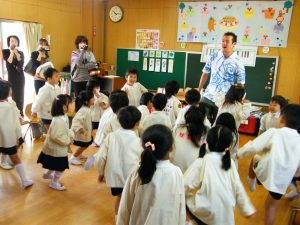
Days were split into morning and afternoon lessons. Each day of the week brought me to a different school – usually two per day. Morning classes were with 20-30 kids. (Not affiliated with me or my employer) Source
The day this threshold became obvious was a private lesson on a Tuesday afternoon in February.
“GUREG SENSEI!” screamed six-year-old Mira. She was interrupting an opening session on adjectives. The students were supposed to ask each other questions like “what’s big?” and answer with short sentences like “An elephant is big.” But Mira had something more important to say.
“Gureg Sensei, atarashi kareshi o mitsuketa! Matsubo-kun! Daisuki!” – Greg Sensei, I have a boyfriend now, Matsubo! I love him!
“M-Mira,” I tried to continue the lesson, but I didn’t expect to understand something like that.
“Ishoni rabu-rabu, kino wa chu-chu shimashita! Metcha kawaii, ureshi desu!” He and I are in love, and yesterday we kissed! He’s so cute and I’m so happy!
The other students laughed, but Mira was unabashed. At my prompting she even made a grammatically reasonable lesson-appropriate sentence: “A-Matsubo-is-cute!”
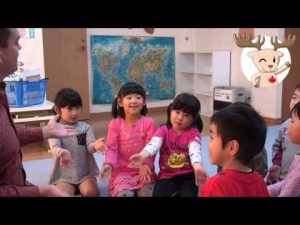
Afternoon private lessons were with 1-10 kids. (Not affiliated with me or my employer) Source
It was hard to be mad at Mira for interrupting. In the last few months she has been hugging me on sight – not so common a greeting in Japan. A student at her kindergarten, where I teach morning and afternoon classes, figured out the English phrase “I love you,” and it spread throughout the whole school like a virus. Mira said it more than anyone.
Yet I still remember her first day, two years ago, when she collapsed into frightened tears at the first sight of me in her English classroom. She wanted to see the previous teacher, but Mark Sensei was gone.
In those days I was quite nervous in my new task, and Mira’s tears didn’t help. My transition, minus that little road bump, is covered in detail here.
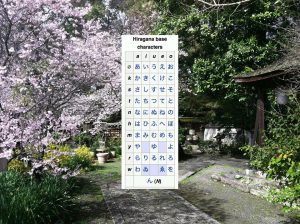
This iPhone homescreen helped for learning Japanese.
Now we come to the happy ending of my journey.
Quite a few students seemed to express their love for me in these closing months.
“Thankyu for teachingu me Englishu” said Soma from my Monday school, on his last day. Of course, his mom taught him that and prodded her confused son into reciting it. But throughout the past week, he spoke more honestly, in Japanese as usual. Kids like Soma would cram their affection in between everyday conversations. “Greg Sensei,” he began one March lesson after a weekend company field trip, “ensoku wa tanoshikatta! Yuuto mo kimashita! Greg Sensei, daisuki. Kyou-no shiru wa nani?” The field trip was so much fun! Yuuto was there! I love you, Greg Sensei. What sticker do we get today?
Students at this school learned basic commands in English, numbers, and the word “times,” in addition to their subject matters.
“Turn around!” Tatsuya would say in English. I did it. The kids screamed with excitement at their newfound power.
“Turn around, five times!” another student would scream, laughing at my dizziness.
“Sit down stand up sit down stand up ten times!”
This job was a great workout.
“Turn around one hundred thousand times!” said Yuuto.
“Who taught you that number?” I’d wail as the children all rolled around in laughter at me.
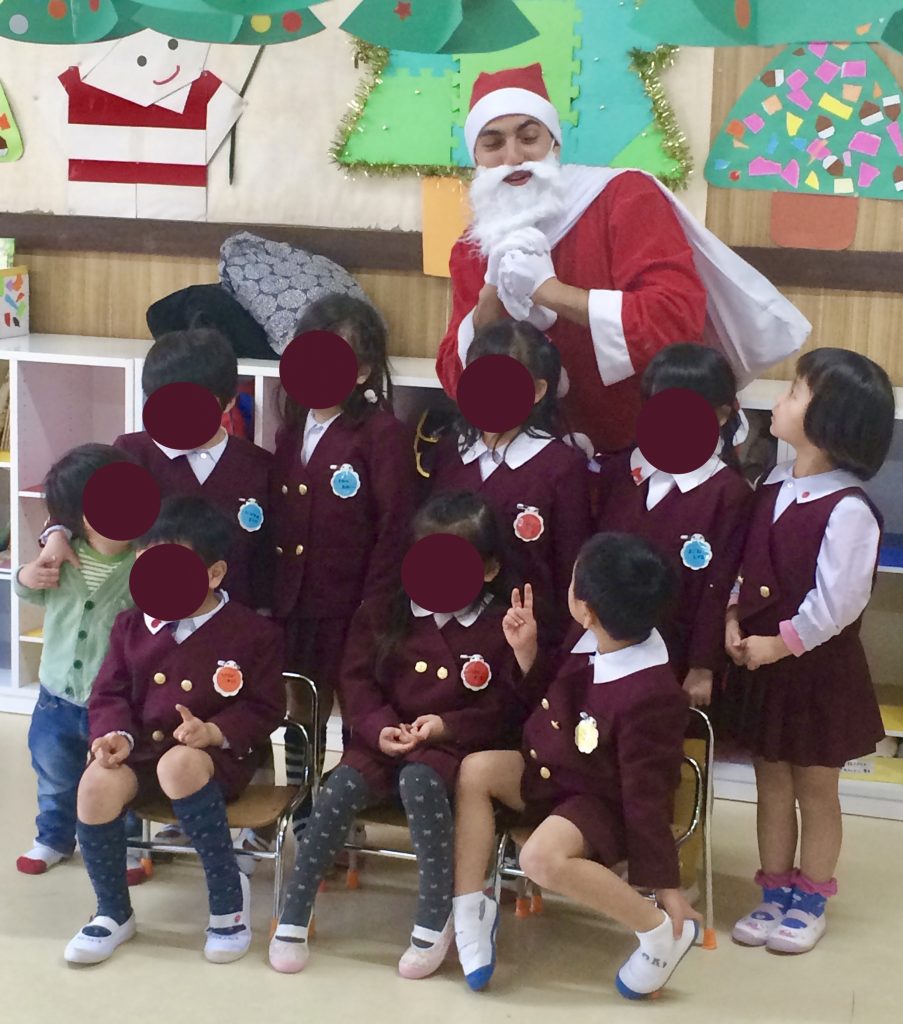
Monday School. The ones looking at Santa, believe it’s Santa.
The Monday school was relatively tame. Students at my Wednesday/Friday school were, for better or worse, famously energized. Located near the city zoo, there was an office joke of “mistaking” the school for the zoo itself. Students coming in would often scream at me one of two requests, which they eventually mastered in English: “Please pick me up!” and “Zombie game!” Oh, and “toilet please!”

Tomu and me before our Halloween lesson. Source
They loved to point out pictures of ghosts, to watch me recoil in horror. “Obaké! Obaké! Mité!” Ghost! Ghost! Look! It never got old for them.
At this school was Tomu, a four-year-old, maybe the fastest learner I taught in my two years. He asked me how to say 100 words or more in English, laughed at every single answer, and never had to be told twice. He dressed as Spiderman for Halloween, and we we battled ferociously.
Another student, Yoshiki, had some trouble writing his name and loved to laugh at mine – “Guregu-banana!” he’d exclaim, repeating the joke I made on our first day, over and over. On that, it was common to hear Emiko or Ririko scream “noooo! Greg Sensei!” in furious correction.
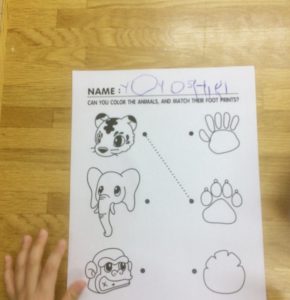
Yoshiki, age three.
Four-year-old Kyoka is half-Chinese, brilliant, screams answers and laughs at everything, with an explosive, uplifting giggle. Recently, after finishing her worksheet, she screamed “sugi wa?” What’s next?, to which I told her to flip it over and practice writing her name again.
Kyoka instead drew a little cartoon character, and wrote “Arigatou, daisuki!” – Thank you, I love you! She presented it to me with a flourish and a long Japanese rant about the cartoon character. At the time many students were giving me notes, mostly on prompt from their parents (the notes reflecting English comprehension they hadn’t achieved). But this one was certainly Kyoka’s inspiration alone.
Sometimes the students expressed love to me; other times, to each other. At my Thursday school, in the opening Q&A session of our lesson, Keito casually informed me of some life news. “Kinou, kekkon shita.” Yesterday, I got married.
“Really?” I responded. “To Riyu?” Riyu sat two seats over. It was a stab in the dark. But Keito nodded.
A bright smile creased Riyu’s chubby cheeks at the surprise on my face. Keito was a fidgety troublemaker, Riyu, a smart, happy teacher’s pet. “Rabu-rabu?” I asked. You two are a couple?
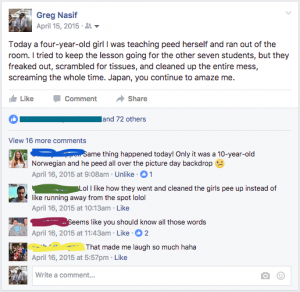
“Toilet please.” Teach it once, practice it every day.
They both nodded. “Kino, kekkon shita, mieru ni itta!” confirmed Marika. They got married yesterday, I went and watched!
And to reaffirm this, the students promptly rearranged seats, Riyu and Keito now sitting together, holding hands, still smiling at me.
The children learn from watching adults.
Many of my kindergartens are staffed by some striking young women. The week of Valentine’s Day, as a bit of a joke but also in a hopeless flirtation effort, I demanded chocolate from these teachers one by one, always in front of my students and in English. Most students just laughed, first at the awkward position of the teacher, and then my plight when the teacher said no. But one screamed out as loud as she could, “GREGGU SENSEI WA KEKKON SHITAI!!” GREG SENSEI WANTS TO MARRY YOU!
Maybe I should have seen that coming.
One teacher actually delivered chocolate, in the midst of a private lesson with just one student. The student, through grunts, demanded a piece – hush money.
That student did more grunting than talking, but one thing she liked to say was “hana takai!” Big nose! As my Japanese proficiency has developed, I have come to hear this phrase in more lessons than not.
My Friday morning students are three and four years old. One adorable little girl with pig tails, Juriya, beats all the rest. Her first three weeks, she donned twin American flag bows. “America!” I exclaimed, pointing to them. She lit up like the Fourth of July. By our third lesson, she was screaming “America!” preemptively, showing me her bows. And then she shouted every answer first.

My Little Pony. Source
Next, she appeared with My Little Pony bows. Maybe her parents think all Americans in Japan like My Little Pony. This didn’t last long. The next week, she came in with little McDonald’s french fry bows. “America!” I screamed again.
In this morning class, with 25 kids, teaching family names (mommy, daddy, grandpa, grandma, baby) goes awry. Many of the young kids treat every picture as a prompt to talk about their family.
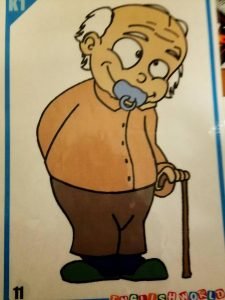
Baby Grandpa
*Baby card appears*
“Gureggu Sensei, onéchan ga imasu, akachan desu…” Greg Sensei, I have a little sister, she’s a baby!
*Grandpa card appears*
“Greg Sensei! Ojiichan wa inaka ni sundeimasu! Kinou itta!” Greg Sensei, Grampa lives in the countryside! I went there yesterday!
*Baby grandpa appears*
“Gureig Sensei! Akachan ga imasu, otot-AHHHHH” Greg Sensei! We have a baby, it’s a bo-AHHHH!”
Nothing, however, produces as great a student reaction as Hungry Sensei, seen below.
Later that Friday, back at the zoo, on my way to class, I run into Ryota. Ryota was my student for only one year, a cheerful boy who nonetheless often misbehaved. He had one weakness – if I ever hummed the theme to Jurassic Park, he had to stop, stare at me, and hum it with me. For old time’s sake, I do it in the hallway on the way to class.

Hungry Sensei’s appearance was usually followed by explosive screams and laughter, and sometimes a debate about whether or not it’s Greg Sensei. Recently, upon meeting two of my replacement teachers who have olive skin, students at multiple schools have addressed them as Hungry Sensei.
“Sore daisuki neh!” Hey! I love that! he yelled informatively, forgetting, maybe, that I ever controlled his mind with it.
Five minutes later, Mio shared a lesson with her best friend Risa. Both smart and sweet, they are a perfect third-year class.
“I live in Osaka,” I said in demonstration.
“No!” screamed Mio. “America!”
“Chi-gaa! No!” screamed Risa. “Daikokucho!” Bingo, for once upon a time, Risa and her Mom ran into me at the neighborhood grocery store in Daikokucho. But Mio didn’t buy it.
“Muri dayo, America kara kita!” responded Mio. Impossible though, he’s from America!
“Yes!” I interjected. “I live in America, and every day I fly to Osaka to teach!”
“eehhhhhhh? Hontouni?” they wailed. Whaaaaat? Really?
At that moment, Masahiro barged in to access his own shelf, and pointed to me. He usually comes in and pretends to do Dragon Ball Z attacks on me, like the great Kamehameha. But today he chose to tease instead. “Unchi Sensei!” he said. Poo Sensei! Before I could respond, Mio screamed.
“GREG SENSEI WA UNCHI SENSEI YUTTE AKKAN! AKKAN DE!”
This could best be translated as Y’ALL DON’T SAY THAT! NEVER!
My girls fight for me.
Indeed, some of the children’s affection has been more surprising.
At my Monday afternoon school, the normally quiet Miora did not seem to be taking her last lesson with me well. In line to say goodbye, she burst into tears, holding on to me and mumbling words I couldn’t understand. I did not realize Miora liked my lessons – or me – so much, for she was often quite shy. Taiki, always enthusiastic and quite fond of me, approached behind Miora.
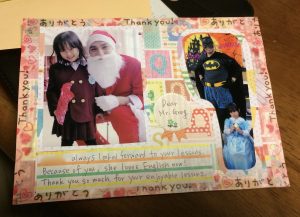
Miori’s goodbye letter.
“Nande naiteru?” he asked my Japanese assistant. Why’s she crying?
“Kyou wa Greg Sensei no saigo desukara,” the assistant replied gravely. Because today is Greg Sensei’s last day.
For a moment, surprise came across Taiki’s face. Only a moment. “See you!” he said with the usual joy, skipping off. Some kids take it better.
As the time period with these children comes to an end, I reminisce. The goal of my job was to teach them English by absorption; that by spending time with me, they would develop an ear for English. The reverse happened – I learned Japanese. Even as they mastered English vocabulary, requests, and basic greetings, the children rarely accepted that I couldn’t understand their Japanese. They almost alway used it first. They spoke and spoke and spoke, forcing the learner’s role onto me as well. Maybe, instead. So I worried. I worried that maybe they’d forget their lessons.
In this mounting concern came my favorite moment in these closing months, that Tuesday afternoon in February.

Dozens and dozens of these
The students began chatting as I grabbed some flashcards. “Maiku Sensei daisuki!” chanted Miyuri to Eimi and Mira. I love ‘Maiku’ Sensei!
I wheeled. “Mike Sensei? Mike Sensei? My name is Mike Sensei?!”
“Chiga!” they screamed. No!
“How do you know Mike Sensei?” I asked, referring to a veteran coworker who did not teach at this school.
“Eigo no sensei!” they said. English teacher. This made no sense to me. Did the kids have a new teacher already? Are they taking lessons somewhere else?
I showed them the yearly attendance with my signature on every day that year. “Mike Sensei never came here,” I explained. “No Mike Sensei!”
Six-year-old Eimi stared at me with eager eyes. She wanted me to understand. A good teacher can’t pick favorites, but Eimi made it hard. She was smart, sweet, worked hard, and put as much effort into helping her classmates as she did into doing her work, which she always did perfectly. She knew my language was English and always sought simple, two or three word sentences to explain herself to me. But she was out of options.
“Nensho… no toki.” During… First Year.
Traveling back in time two years, before I was Banana Sensei, back to my training days… when I came to this school to teach my own students for the first time. When my first student, Mira-chan, with no classmates back then, came to the door and collapsed into tears. What was it she had said?
“Mark Sensei wa?” Where’s Mark Sensei?
My eyes refocused onto Eimi, seated next to that same girl, twice the size now, with a huge smile on her half-toothless face, still ranting about her new love, Matsubo.
“Mark Sensei?” I asked them.
“YES!” they burst in in English.
As the students resumed their chatting, relief and joy washed over me.
The children will grow, their brains will string, they will learn skills and trades, they’ll make new opinions, find new love, travel the world, and English will be of varying importance to each of them. Some will remember their English, and some may forget it.
But they remembered Mark Sensei. They will remember Greg Sensei. And Greg Sensei will remember them.

Thank you for reading. Follow live @gregnasif on Twitter or Instagram.
Unless specified otherwise, all photos are property of Gregory A Nasif.
The responsibility for this blog post belongs solely to the writer, Gregory A Nasif, and not with his employer.